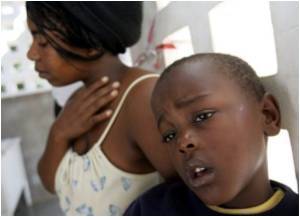
"Driven largely by entrepreneurs, innovative and affordable technologies to improve health in Africa are under development throughout the continent," said Ken Simiyu, who co-authored the study for Canada's McLaughlin-Rotman Center for Global Health (MRC).
"Clearly, many Africans have the needed talent and know-how," he told AFP.
After touring laboratories in sub-Saharan Africa, the Kenyan scientist discovered a plethora of dormant innovations:
-- A low-cost dipstick technology developed in Ghana for quick village diagnosis of schistosoma, a parasitic disease that affects more than 50 percent of people in some areas of Africa.
-- An easy-to-use and inexpensive portable medical-waste incinerator developed in Uganda that could solve the problem of hospital waste management in rural areas, especially during mass immunisation programmes.
Advertisement
There are many other such African inventions that have not hit the market.
Advertisement
African countries dedicate an average of 0.2 to 0.3 percent of GDP to research and development, 10 times less than developed countries.
But while the scientists behind those innovations have not always received adequate funding, they have also lacked the required contacts and skills to move their products to the stages of licensing, manufacturing and marketing.
The Kenya Medical Research Institute (KEMRI), for example, built a facility to produce AIDS and hepatitis B diagnostic kits but the factory has remained idle due to a regulatory change from the government, its main purchaser.
One of the study's papers relates how the commercialisation of a drug developed by Nigeria's National Institute for Pharmaceutical Research and Development to treat sickle-cell anaemia never got off the ground.
The product is one of the few low-toxicity drugs to treat the disease, a chronic blood disorder that affects four million people in Nigeria alone and afflicts many people of African descent in the West.
However, the treatment, called Niprisan, never achieved success due to a raft of problems "such as insufficient manufacturing capacity, quality control issues, pricing and distribution, and lack of financing," the study said.
The study did identify some success stories, such as the Tanzanian company A to Z Textiles, which managed to overcome regulatory and procurement hurdles to become one of the world's largest producers of insecticide-treated bed nets.
In a preface to the work, Harvard professor Calestous Juma noted that concern over access to medecines had dominated the health policy debate for years, wrongly assuming that Africa would continue to rely on imports.
"This collection of original papers provides a different prognosis. They reveal an emergent 'health innovation system' in Africa," he said.
McLaughlin-Rotman Center director Peter Singer stressed that African know-how -- 16 of the 25 innovations studied involved traditional plant products -- needed to be urgently supported.
"Required are creative institutions and coherent policies that reduce risk, build on local strengths, and promote the effective use of local health research," he said.
"Many people will die if we wait for scientists from elsewhere to invent and market the health products Africa needs," Singer said.
Source-AFP









